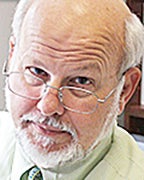Follow the bouncing (tech) ball
Published 12:00 pm Tuesday, July 12, 2016

- Charlie Mitchell
Some say “leapfrog.” Tennis terms are better. Technology serves an update. The return can be a lob, or it could be a rocket. But there is always a return. No aces. Then another serve, then another return.
It really could be a sport, this one-upping the permeates our daily lives.
This month, with limited fanfare, the three elected members of the Mississippi Public Service Commission have been traversing the state to encourage people to enroll in the new and improved “No Call” service.
What’s new and improved? As a weapon against telemarketers, we’ve been able to enroll our wired phones in the state (and federal) no-call database since 2003. In 2015, the Legislature expanded the law to cell phones. (The feds had already done this.)
The techno-history is fun.
In the late 1980s, phone companies started pitching the idea of Enhanced 911 emergency services. Centralized dispatching had been around since 1970 — meaning people no longer had to dial the police or the sheriff or the highway patrol or the fire department or the ambulance service separately. Digital technology added a big plus — dispatchers could instantly see the address connected to the phone from which a call was being placed. Customer bills were increased to pay the big fees phone companies charged for access to proprietary data, but that’s not relevant here. This was Flash Gordon stuff. People got service faster. That’s what mattered.
Anyway, in rapid fashion Caller ID became available to all. Not such a big deal. Today, it’s ho-hum to know who is calling. Back then it was an absolute marvel.
About the same time, computer-driven dialing (robo-calling) technology was developed. It was a bonanza for sellers of goods and services — or so they thought. Phone owners who didn’t purchase Caller ID were at their mercy. Phone owners who did purchase Caller ID were soon offered another purchase — Call Blocking — so calls from identified sources would be rejected.
See? Each development begets another development. Back and forth.
Congress had already taken some baby steps in 1991 with the Telephone Consumer Protection Act, so it was no big deal to add a No Call requirement and then to extend it, as Mississippi and most states have, to cell phones.
A pause here to mention the PSC. The members, Brandon Presley from the Northern District, Cecil Brown from the Central District and Sam Britton from the Southern District don’t get much notice, but they should. PSC members were best known for a long time for rubber-stamping anything any utility company wanted. That’s no longer true. Presley, Brown and Britton strike fear in the hearts of the big players. They are fair, but deal at arms-length. It’s kind of a novelty, really.
Back to the phones.
Cell phones, like wired phones, now almost always come equipped with technology to show who is calling and to block calls from identified numbers. One answer from the creative (sneaky) minds in telemarketing has, to date, been to place calls from a variety of numbers. The same company selling the same thing might call from a Nebraska number, then Montana, then California. In theory, the company would not be able to use this dodge if a cell number is on the no-call list.
There are exceptions, of course. Political organizations, charities and telephone surveyors are not required to screen out numbers on the lists. Yes, Donald will be calling, as will Hillary. So will pollsters, as well as advocates for Donald or Hillary who try to sound like pollsters.
The most common exception is “existing business relationship.” No Call does not apply to any entity with which a person has had a commercial exchange in the past 18 months. (There’s a really sneaky end run in this context. If a person receives an email, say, from a vacation club, opens it and asks or answers any question the person has established a business relationship and can be called 20 times a day.)
So let the game continue.
In this and so many other contexts — some pretty serious (identity theft) and some not-so-serious (video game cheats) — one advance leads a protective response. Think about all the software writers and computer programmers who go to work every day with one goal: outfox the other guys.
Just as at a tennis match, we’re on the sidelines. We watch and (when we’re not cursing) we marvel.
Charlie Mitchell is a Mississippi journalist. Write to him at cmitchell43@yahoo.com





